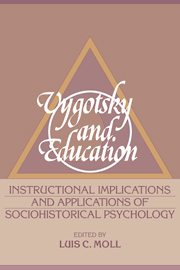Book contents
- Frontmatter
- Contents
- List of contributors
- Preface
- Acknowledgments
- Introduction
- Part I Historical and theoretical issues
- 1 Vygotsky: The man and his cause
- 2 The historical context of Vygotsky's work: A sociohistorical approach
- 3 Cognitive development and formal schooling: The evidence from cross-cultural research
- 4 The voice of rationality in a sociocultural approach to mind
- 5 The social origins of self-regulation
- 6 Vygotsky, the zone of proximal development, and peer collaboration: Implications for classroom practice
- Part II Educational implications
- Part III Instructional applications
- Name index
- Subject index
6 - Vygotsky, the zone of proximal development, and peer collaboration: Implications for classroom practice
Published online by Cambridge University Press: 05 June 2012
- Frontmatter
- Contents
- List of contributors
- Preface
- Acknowledgments
- Introduction
- Part I Historical and theoretical issues
- 1 Vygotsky: The man and his cause
- 2 The historical context of Vygotsky's work: A sociohistorical approach
- 3 Cognitive development and formal schooling: The evidence from cross-cultural research
- 4 The voice of rationality in a sociocultural approach to mind
- 5 The social origins of self-regulation
- 6 Vygotsky, the zone of proximal development, and peer collaboration: Implications for classroom practice
- Part II Educational implications
- Part III Instructional applications
- Name index
- Subject index
Summary
Vygotsky, when introducing the concept of the zone of proximal development, declared that “more competent peers,” as well as adults, can aid children's development (1978, p. 86). Although there has been a recent upsurge of interest in Vygotsky's theory, fueled by several influential books (e.g., Wertsch, 1985a) and research based on Vygotskian theory (Rogoff & Wertsch, 1984; Valsiner, 1987; Wertsch, 1985a), most of this interest has centered on the role adults play in fostering children's development. The same focus is apparent in this book; not unnaturally, in a volume devoted to education, the role of adults is given a good deal of emphasis.
I have chosen, instead, to examine the effects of collaboration between peers. After all, in many classrooms children work in groups, either under the guidance of a teacher or aide or as members of a team, working together to solve a problem with little or no adult guidance. In some classes, children also act as tutors, helping less competent peers learn some relatively straightforward skill. Even where peer collaboration is not encouraged, the potential role of such collaboration should not be casually dismissed.
There is a theoretical, as well as a practical, motivation for examining peer collaboration. Because the research set within a Vygotskian framework has almost exclusively focused upon adult–child interaction and has supported the view that providing information within a child's zone of proximal development can be highly beneficial, the impression left is that development proceeds in the direction of current adult models of culturally appropriate practice.
Information
- Type
- Chapter
- Information
- Vygotsky and EducationInstructional Implications and Applications of Sociohistorical Psychology, pp. 155 - 172Publisher: Cambridge University PressPrint publication year: 1990
Accessibility standard: Unknown
Why this information is here
This section outlines the accessibility features of this content - including support for screen readers, full keyboard navigation and high-contrast display options. This may not be relevant for you.Accessibility Information
- 93
- Cited by
